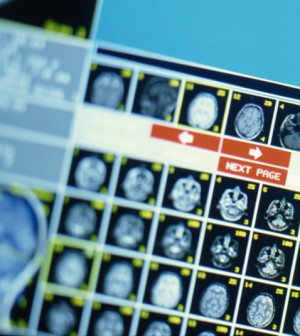- Are You Making This Expensive Thermostat Error This Winter?
- Recognizing the Signs of Hypothyroidism
- 10 Strategies to Overcome Insomnia
- Could Artificial Sweeteners Be Aging the Brain Faster?
- Techniques for Soothing Your Nervous System
- Does the Water in Your House Smell Funny? Here’s Why
- Can a Daily Dose of Apple Cider Vinegar Actually Aid Weight Loss?
- 6 Health Beverages That Can Actually Spike Your Blood Sugar
- Treatment Options for Social Anxiety Disorder
- Understanding the Connection Between Anxiety and Depression
Many Kids May Have High Cholesterol, Regardless of Weight


About one of three Texas kids screened for cholesterol between the ages of 9 and 11 had borderline or high cholesterol, potentially placing them at greater risk for future cardiovascular disease, a new study has found.
Obese kids were more likely to have abnormal cholesterol levels, but a large percentage of normal-weight children also had borderline or high cholesterol, said lead investigator Dr. Thomas Seery, a pediatric cardiologist at Texas Children’s Hospital and an assistant professor of pediatrics at Baylor College of Medicine, in Houston.
“The reality is that 35 percent of kids who were not obese had abnormal cholesterol as well,” Seery said.
Physicians and parents need to teach kids healthy habits, such as eating right and exercising regularly, or as adults they will be more likely to suffer heart disease and stroke, he said.
“Cardiovascular disease in children is rare, but we know that atherosclerosis has its beginnings in childhood,” Seery said. “The better a job we do now, the better they will do later in life.”
Previous studies have indicated that as many as 70 percent of children who have elevated cholesterol levels maintained those high levels as they entered young adulthood, said Dr. Patricia Vuguin, a pediatric endocrinologist at Cohen Children’s Medical Center in New Hyde Park, N.Y.
“Your cholesterol at 9 is a reflection of where your cholesterol is going to be in your 40s and 50s,” Vuguin said.
The new findings, scheduled to be presented Monday at the annual meeting of the American College of Cardiology, held in Washington, D.C., take an even darker tone when held next to another study also featured at the meeting.
That study found that middle-school kids who spend two hours or more at a television or computer screen each day are more likely to chow down junk food and have increased risk of cardiovascular disease, researchers said.
The study of about 1,000 sixth-graders in southeast Michigan found that avid TV viewers and computer/video game users both reported eating about 3.5 snacks a day — one full snack more than children who had low exposure to these technologies.
“Parents need to monitor their kids’ activities,” said senior author Dr. Elizabeth Jackson, an associate professor in the division of cardiovascular medicine at the University of Michigan. “Our results offer even more reason to limit the amount of TV time kids have and are right in line with current recommendations,” she said in a meeting news release.
Seery and his colleagues undertook their research after new guidelines for juvenile cholesterol screening were issued by the U.S. National Heart, Lung, and Blood Institute in 2011 and endorsed by the American Academy of Pediatrics.
The guidelines call for all children between the ages of 9 and 11 to undergo a cholesterol screening, with a follow-up screening between ages 17 and 21.
To see what these screenings might reveal, the researchers reviewed the medical records of nearly 13,000 children tested for cholesterol levels between January 2010 and July 2013 as part of a routine physical exam within the Texas Children’s Pediatrics Associates clinics, a large pediatric primary care organization.
They found the following:
- Boys were more likely to have abnormal levels of total cholesterol, “bad” LDL cholesterol and triglycerides (blood fats).
- Girls were more likely to have abnormal levels of “good” HDL cholesterol.
- Hispanic children were more likely to have abnormal levels of triglycerides and HDL cholesterol.
- Obese children were more likely to have across-the-board abnormal levels of every type of cholesterol, with 41 percent suffering a borderline or high total cholesterol levels.
- About 35 percent of healthy-weight children had abnormal total cholesterol levels.
Seery hopes these findings will lead pediatricians to follow the recommended cholesterol screening guidelines for children.
These screenings present “the perfect opportunity for clinicians and parents to discuss the importance of healthy lifestyle choices on cardiovascular health,” he said. “Our findings give a compelling reason to screen all kids’ blood cholesterol.”
He intends to conduct follow-up research to see how well pediatricians are adhering to the guidelines.
Some pediatricians have been reluctant to screen for fear that children will be put on cholesterol-lowering medications like statins, Seery said.
But another expert suggests that’s not likely to happen for most kids.
Only about 1 percent of kids actually qualify for statins, and only then due to genetic factors that cause their high cholesterol, said Dr. Stephen Daniels, chair of pediatrics at Children’s Hospital Colorado and a spokesman for the American Heart Association.
“The concern is that over a very long term, we don’t really know what the adverse effects of statin use might be,” Daniels said. “We’ve tended to reserve treatment with statins for children with the very highest levels of LDL cholesterol.”
Instead, doctors and parents should emphasize the importance of a healthy diet and regular exercise in controlling cholesterol levels in kids, he said.
Vuguin said the study does have some drawbacks, however. Because it only involved children in Texas, it may not reflect the health of kids nationwide, she noted.
Also, the study looked back on cholesterol screenings that had already taken place, she said. It’s unknown whether doctors requested these screenings on kids who had other health concerns, which could skew the numbers, and whether these kids had their screening following a proper fast to make sure their cholesterol levels didn’t get a last-minute bump from the slice of pizza they ate hours before.
Because the new research was presented at a medical meeting, the data and conclusions should be viewed as preliminary until published in a peer-reviewed journal.
More information
For more about children and cholesterol, visit the American Heart Association.
Source: HealthDay
Copyright © 2026 HealthDay. All rights reserved.










